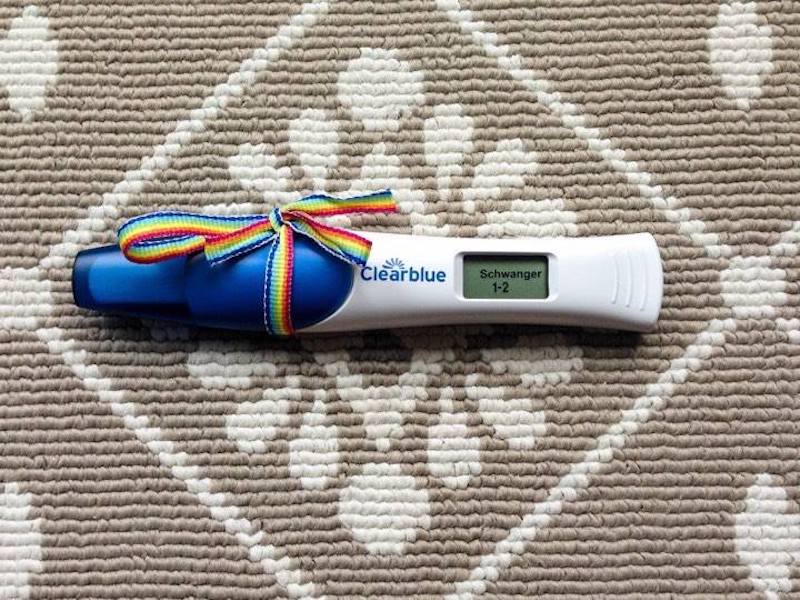(Editor’s note: This is the third and final installment in the “Having a baby in Berlin” series. You can see Part 1 here and Part 2 here.)
A Berliner is born!
 Tending towards the “crunchy” (to use an American expression) side of things when it comes to parenting, we had decided to opt for a natural birth at a Gerburtshaus (birth house or birth centre).
Tending towards the “crunchy” (to use an American expression) side of things when it comes to parenting, we had decided to opt for a natural birth at a Gerburtshaus (birth house or birth centre).
Whilst natural birth is generally promoted in German hospitals, we felt that being at the Gerburtshaus would give me the best chance at the ‘peaceful’, unmedicated birth I was looking for. Think of a kind of bohemian spa hotel, with a full size normal bed, candles, a birth tub, and … medical equipment hidden in the cupboards.
Jokes aside, this place was amazing, and I couldn’t quite believe that our public health insurance covered it.
Our particular Gerburtshaus was staffed by two teams of seven midwives who would be responsible for most of my prenatal, labour and delivery, and postnatal care.
I was placed on Team A – the team with the most English speaking midwives – and we crossed our fingers that the midwife on call on the day I went into labour would be one of the 5/7 that we’d be able to speak to in English.
Prenatal appointments with the non-English speaking staff had gone OK up until that point, but my rudimentary German and efforts at communicating through hand gestures, would only get us so far once I was several centimetres dilated and the contractions were coming in thick and fast.
Now every first-time Mum will tell you that the idea of contractions or labour pains sounds pretty unpleasant. But let me tell you, they sound a lot less unpleasant than Schmerzen; which is what the midwife referred to them as when she came to check on me at home after my waters broke.
And by the time she arrived they were starting to get pretty intense.
Time to head to the Geburtshaus!
As luck would have it, the midwife on call for the night shift had spent time working in the NHS in the UK; spoke perfect English; and even understood our weird British sense of humour.
Things were going well!
By this point, after months of prenatal appointments and several hours of increasing schmerzen, I also found I had completely overcome my weird British-Victorian-era rooted fear of my own body.
Our son’s birth turned out to be every bit as calm and dreamy as I had hoped for. He was here! We were finally expat parents! Three cheers for German healthcare, and a round of applause for our amazing midwife.
The hard part was over!
Or so we thought….
Babies, benefits and bureaucracy
 The benefits parents and parents-to-be are entitled to in Germany are fantastic (and prompted us to give ourselves a pat on the back for deciding to make the move from the U.S., where we’d been based prior to Berlin). A generous monthly allowance for each child in your family plus 14 months of paid parental leave following the birth of your child, leave that can be shared between BOTH parents!
The benefits parents and parents-to-be are entitled to in Germany are fantastic (and prompted us to give ourselves a pat on the back for deciding to make the move from the U.S., where we’d been based prior to Berlin). A generous monthly allowance for each child in your family plus 14 months of paid parental leave following the birth of your child, leave that can be shared between BOTH parents!
Home help available on prescription and paid for by your public insurance if you need additional assistance with housework or childcare whilst pregnant or after the baby arrives.
Wow!
Elterngeld (“parents money” or parental leave allowance) is paid at 67 percent of your usual income, with a minimum payment even for those who had no income prior to having a baby. And it can be taken by either Mum, Dad, or both parents.
Full time or part time. And then there’s Kindergeld (children’s allowance) which pays out at between €192 and €223 per child per month.
Brilliant right?
Figuring out what exactly you’re entitled to and how to claim it, however, is decidedly less fantastic!
German bureaucracy is notorious for its abundant paperwork, but nothing quite prepared me for the onslaught of form-filling we faced as we anxiously awaited the arrival of our firstborn. Let’s start with Elterngeld…Just download, print, fill in, and return this complicated 17 page(!!) document, complete with a seemingly unending list of necessary supporting evidence.
No problem!
Repeat for Kindergeld, birth certificate, residence registration etc etc etc.
Oops… your birth certificate got held up for 3 months in the queue. Your fault for living in a Kiez (neighbourhood) where babies are seemingly churned out at a dozen per minute.
Go directly to broke, do not pass go, do not collect any Kinder or Elterngeld.*
And so we found out that navigating German bureaucracy as sleep deprived new parents required enormous patience, unwavering dedication, and a whole lot of help from our friends. In short, it was excellent practice for the parenting challenges yet to come.
Thus concludes the story of our first (rather eventful) nine months in Berlin.
Would I say giving birth in a new country is easy? Ach nein!
But then this is the challenge that we expats sign up for, right? If we wanted to do things the easy way we would all have moved back home long ago.
And as it turns out, the birth of our first expat baby didn’t deter us from wanting to expand our family. A year and a half later we willingly signed up to face this whole challenge a second time.
But that’s another story…
(*Full disclosure: we expats are most definitely a contributing factor to this bureaucratic gridlock.)
 Resources for parents and parents-to-be in Berlin:
Resources for parents and parents-to-be in Berlin:
• Supermamas Berlin is a volunteer network of mothers helping out other mothers who just gave birth by providing freshly cooked meals and a little chat.
• A useful list of German vocabulary for pregnancy, birth, and getting ready for baby. From the blog, ‘In Berlin, Baby’
• A guide to having a baby in Berlin. From the very useful blog, ‘Berlin for all the Family’
• Another great guide to prenatal care in Berlin from, ‘The German Way’
• An up-to-date guide to Elterngeld from “Maternita,” a maternity concierge and baby planner service that provides assistance, in multiple languages, to parents attempting to navigate the German system
• A guide to Kindergeld and how to claim it.
• The expatbabies and expatkids Berlin Facebook communities. Both are very friendly and incredibly useful groups. There are also lots of subgroups for various neighbourhoods and particular interests that you can find links to within the groups. They mostly operate in English, but have expat members from all over the world
 About the author:
About the author:
Originally from the U.K., Laura Kaye currently lives with her family in Berlin. Having left the U.K. in 2009 to pursue a career in the humanitarian and development sector, she has since lived and worked in multiple countries across three continents. Laura moved with her husband in 2014 and is currently taking a career break to raise their 3-year-old son.
More posts by Laura Kaye
An open letter to the undecided: ‘My family is right at the heart of the EU membership vote’
Laura Kaye is a freelance writer, researcher and editor. Her work focuses on social and development issues, parenting and family life.
Originally from the Wirral in the United Kingdom, she is a serial expat now happily living in Berlin, Germany.















